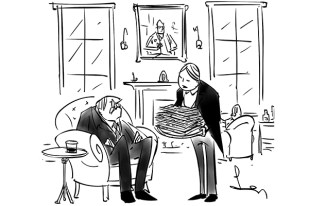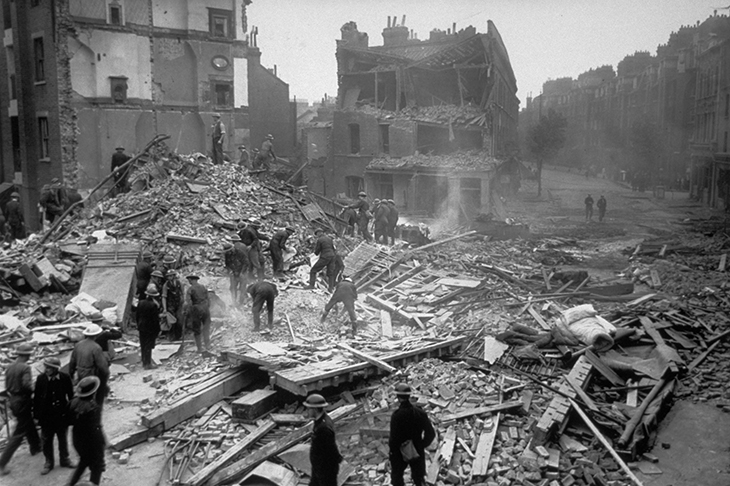Francis Spufford was already admired as a non-fiction writer when he published his prize-winning first novel, On Golden Hill, in 2016. Set in 18th-century America, it was a tour de force of historical imagining, its prose skilfully suffused with the writerly tics of that era yet not overly so, leaving it pedantry-free and compulsively readable.
His new book, Light Perpetual, is also a historical novel, but with a difference. It follows the arc of the 20th century through the stories of five working-class Londoners, but its central conceit is a clever counterfactual. The opening scene sees all five, then young children, being killed in an air raid during the second world war. How, asks Spufford, might their lives have panned out had they lived?
Fiction that plays tricks with time has a pedigree, from Washington Irving’s Rip Van Winkle (1819) to Martin Amis’s Time’s Arrow (1991) to the many 20th-century children’s classics in which characters go back or forward in history. Here we begin in what almost seems like the world of sophisticated, philosophical sci-fi fantasy, as a V-2 rocket races towards a branch of Woolworths on a south London high street on a November Saturday morning in 1944 and time stands still:
Matter has its smallest, finite subdivisions. Time does not. One ten-thousandth of a second is a fat volume of time, with onion-skin pages uncountable… Each of the parts is as limitless as the whole, because infinities don’t come in larger and smaller sizes.

Yet the purpose of the book is not to boggle our minds with the outer reaches of the space-time continuum but to engage our humanity in precise and empathetic prose.
It’s moving to discover from the acknowledgements that Spufford was inspired by a plaque in the New Cross Road commemorating the victims of an actual V-2 attack on Woolworths. His characters’ names, it turns out, are real, though the identities he has created for them are imagined. As the novel opens out we revisit the diverging lives of Val, Jo, Alec, Vernon and Ben at intervals, from 1949, when we see them together in the classroom at the local primary school, to 2009, which finds Ben, the first of the five to go, on his deathbed.
These unlived lives, and the loss they represent, are transfigured by their very ordinariness. It’s not as if any of them might have changed the world by, say, finding a cure for cancer, had they actually lived. Yet Spufford makes his characters resonate with the everyday miracle of what it is to be human, touched both by evil and by good, their lives moulded, too, by the social, cultural, political and indeed technological changes of the second half of the 20th century. We care about what happens to them next.
Alec, for example, begins a career in print full of drive and enthusiasm, but his job as a typesetter at the Times will come to an end following the industrial disputes of the late 1970s and early 1980s. Spufford is good at recreating worlds, from the shuddering presses of old Fleet Street to California in the 1970s, where Jo, first seen singing in chorus with the other children at primary school, has become a backing singer for a rock star. They first met in a Soho jazz club in the early 1960s; he has become a household name, but her lack of confidence means that she has never released an album of the folk songs she records in private.
A V2 races towards a south London Woolworths one November morning in 1944 and time stands still
If Jo’s gender, along with the sexism of her era, is partly to blame, her twin sister Val experiences misogyny in a more sinister form, ending up the abused wife of a racist thug, complicit enough in the cycle of abuse to stand passively by while he’s beating an Asian man to death in a car park, with the result that she is jailed as an accessory to the crime. Spufford counters the banality of evil with hope: on her release, Val becomes a counsellor with the Samaritans.
Bad things happen to people; people do bad things. Yet Spufford remains cautiously optimistic about the potential for human redemption. The bus conductor Ben, who suffers from paranoid delusions, is, for example, cured by the love of a good woman. Here, perhaps, we can see the author’s faith — about which he wrote in his engaging apologia, Unapologetic: Why, Despite Everything, Christianity Can Still Make Surprising Emotional Sense (2012) — quietly working away in the background, although he never stuffs it down our throats. Religion is there too in the novel’s title, taken from the Requiem mass. Yet it’s in its rendition of the here-and-now, rather than in any theological striving after the eternal, that this book truly comes to life.






Comments